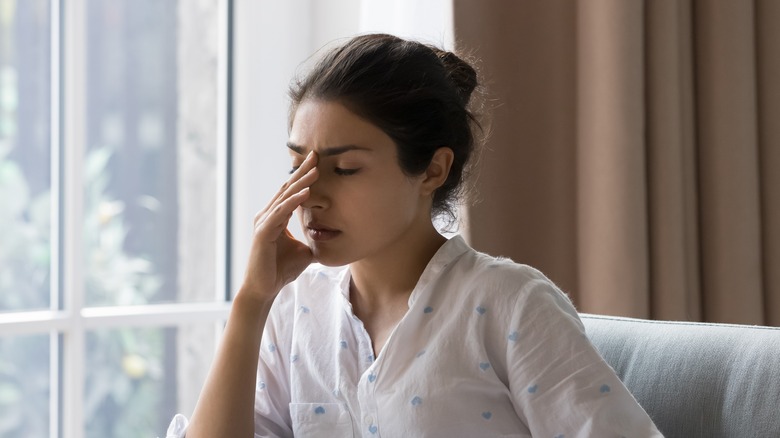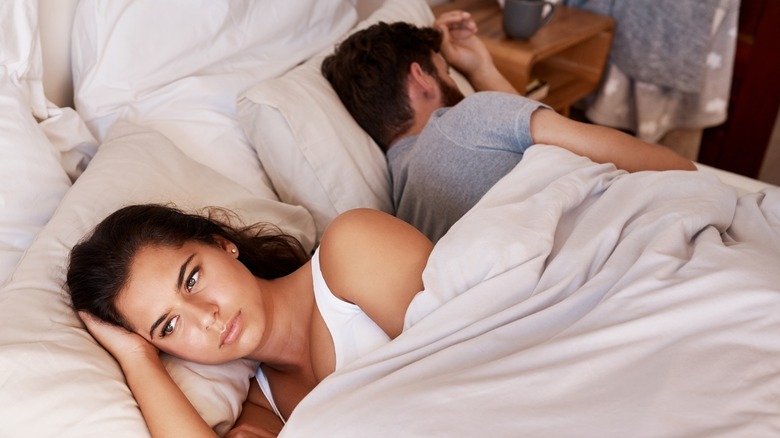Strange Things That Happen To Your Body When You Suddenly Stop Doing Cardio
It's no secret that getting enough exercise is vital to your health and wellbeing. There are many different types of cardiovascular exercise, from running and dancing to swimming and cycling. Whether high- or low-impact, these kinds of workouts offer many benefits. They get the blood flowing through your body, increase your heart rate, and help you stay in shape. They can also boost your confidence if your primary goal is to lose weight or become stronger overall.
While these types of rewards are priceless, you can only expect to reap them — and continue reaping them — if you're committed to a regular cardio exercise routine. That means establishing some sort of schedule that involves exercising to get your heart rate up for a specific amount of time multiple times a week. You don't have to do cardio exercise every day, of course. Many argue that this can overwork certain muscles, and that it's better to mix up your routine with strength training and take regular days off to ensure your body is sufficiently well rested.
But what happens when you suddenly stop your cardio workouts completely? It turns out that this change to your routine can have a far more dramatic impact on your overall health and wellbeing than you might expect. Here are some of the more unusual effects you may experience as a result of stopping cardio suddenly.
Cognitive function starts to decline if you stop doing cardio
You may not necessarily correlate the two, but cognitive function and cardio exercise are intrinsically linked. Research has found that discontinuing those workouts could directly affect brain health, leading to a whole host of unwelcome symptoms like foggy mind, anxiety, and difficulty making decisions. That's not surprising, according to John Ratey, M.D. As the associate clinical professor of psychiatry at Harvard Medical School explains to Men's Health, "More brain cells are being activated when we exercise than when we're doing anything else."
During a talk for the MIT Media Lab's Wellbeing Seminar Series, Ratey said, 'We know from studies, when we stand our brains are a little bit better, maybe 7 percent better than when we're sitting." Results of studies confirm this theory. One study conducted by the Department of Kinesiology at the University of Maryland, College Park, found that exercising regularly improved memory and overall cognition among both younger and older adults.
Another study published in Comprehensive Physiology concluded that exercising regularly during all stages of life can lead to positive cognitive outcomes. Among the findings was the discovery that exercising could support the structural condition of specific parts of the brain, specifically those that control important functions like memory and understanding. It also promotes improved overall brain function.
You may start feeling depressed if you quit cardio
Exercise releases endorphins, the natural "feel-good" chemicals that are responsible for alleviating feelings of stress and depression. It's one of the key reasons that people may consider exercise a primary line of defense against them — and why professionals advise their patients to engage in regular exercise. Says Jennifer Carter, PhD, to the American Psychological Association (APA), "I often recommend exercise for my psychotherapy clients, particularly for those who are anxious or depressed. I think clinical and counseling psychologists could do a better job of incorporating exercise into treatment.
If you stop exercising, you may notice thatyou feel down. Some researchers believe that cardio exercise tamps down the fight-or-flight response that triggers anxiety, causing people to experience symptoms like racing heart, sweating, and adrenaline rushes. The study found that exercise retrained the mind to associate those symptoms with workouts instead of fear. "Exercise in many ways is like exposure treatment," explains Jasper Smits, PhD, to the APA. "People learn to associate the symptoms with safety instead of danger."
Exercise also serves as a distraction from whatever might be on your mind. Simply breathing more deeply can help you calm down and see things more clearly. "Whether it's through cardio-related physical activities or more mild, less intense movement like walking or doing housework, a person is able to literally work out some emotions by breathing more deeply and by actively re-channeling emotions through one's body movements," psychologist Yvonne Thomas, PhD, tells Real Simple.
Your libido can nosedive if you don't do cardio
You're more likely to notice a greater interest in sex if you commit to a regular cardio exercise routine. That's largely because the benefits of exercise, like improved mood and energy levels, correlate with greater confidence, which can in turn increase your sex drive. The less that you exercise, the greater the possibility that your libido may plummet.
Interestingly, there's such a thing as exercising too much, too — and that could actually cause your libido to drop. It's best to stick with moderate cardio workouts if you're concerned about a declining sex drive, explains Rebecca Alvarez, a sexologist, to InStyle. She says that regular exercise is typically linked to general feelings of wellbeing, which in turn is linked to a greater interest in sex. Adds Ana Gonzalez Herrera, a holistic health professional, "Moderate exercise has been shown to boost testosterone levels in men and women." As testosterone is a sex hormone responsible for regulating libido, among other things, it's reasonable to associate this boost with an improvement in intimacy.
What's the problem with doing more cardio than average? It all comes down to overdoing it. Grayson Wickham, D.P.T., C.S.C.S., a physical therapist, tells InStyle, "Overtraining syndrome is caused by a combination of too much exercise and not enough recovery." That can cause you to feel exhausted, agitated, and generally overwhelmed, all of which can cause your sex drive to tank.
You can't sleep as well when you don't exercise regularly
You may know that a lack of sleep can affect your ability to function to the best of your abilities the next day — but did you know that your dedication to regular cardio exercise (or lack thereof) can impact your sleep, too? People often sleep better when they exercise more. Even if you just exercise one day a week, you might notice that you sleep more soundly that night. The sleeping hours are widely known as the time that your body spends recovering from physical activities performed during the day.
Natalie Pennicotte-Collier, a sleep expert, tells Vogue, "Physical activity increases time spent in deep sleep, the most physically restorative sleep phase. Deep sleep helps to boost immune function, support cardiac health, and control stress and anxiety." And as Charlene Gamaldo, M.D., the medical director of Johns Hopkins Center for Sleep in Howard County General Hospital, states, "We have solid evidence that exercise does, in fact, help you fall asleep more quickly and improves sleep quality.
When you exercise may play a significant role in just how well you sleep, too. Because cardio workouts release endorphins, you might feel more alert than you would otherwise (via Sleep Foundation). Exercising also raises the body's core temperature, which could keep you awake for longer. This temperature tends to drop within 90 minutes, so if you prefer to work out at night, it's best to time it at least a couple of hours before bedtime.
With a lack of exercise, digestive issues might start to occur
Maybe you're prone to occasional stomach drama or deal with digestive problems more frequently. Or maybe you've recently stopped cardio exercise and discovered that your stomach feels strangely uncomfortable far more than it ever has before. It's entirely possible that quitting your routine could exacerbate the problem. This is because exercise stimulates the intestines and helps you stay regular by reducing the amount of time that it takes for food to digest.
Exercise also offers a variety of other gut-specific benefits that promote better digestion. Specifically, when you work up a sweat and get your heart rate up during cardio workouts, you breathe faster. This also has a stimulative effect on the gastric system, causing the intestines to contract and supporting more productive digestion and bowel movements.
Not only that, but cardio exercise can also reduce cortisol and adrenaline levels in the body. These stress hormones could potentially disrupt the delicate gut microbiome that's responsible for everything from your overall immune health to your metabolism. If you quit exercising, you may notice a change in your gut health as a result — in more ways than one.
You may be more compelled to overeat when you exercise less
Research has found that quitting your exercise routine can have a direct effect on your appetite — namely by increasing the chances that you'll overeat. Of course, there's nothing wrong with treating yourself and enjoying an indulgent meal when you want it. But what happens when it becomes a habit and you can't quite control your cravings? A lack of exercise could be the culprit.
It's down to two key hormones that are released when you exercise. One is ghrelin, an appetite stimulant, and the other is peptide YY, which reduces your appetite. When you engage in an intense cardio workout, like running or dancing, increased peptide YY hormones are released while ghrelin is tamped down. Rebecca Crochiere, Ph.D., who authored a study about the link between exercise and appetite, told Runner's World, "Another potential explanation is that exercise boosts mood or self-esteem, which then improves motivation to eat well or within one's diet."
The key is to commit to more rigorous workouts instead of anaerobic activities that don't last for longer than a few minutes at a time. That's because only more intense cardio exercise has an effect on peptide YY, which is the more significant hormone to consider if your goal is to suppress your appetite.
It may impact your sense of smell if you don't exercise
There are many reasons why your sense of smell may dull. Maybe you caught a cold or you have nasal polyps. However, an unexplained loss of smell after you stop doing cardio exercise could potentially be for that very reason — you've stopped exercising! Workouts boost blood flow to the brain, and when that's diminished, it could affect the olfactory bulb, which is vital to your sense of smell.
The findings were published in a JAMA Otolaryngology-Head & Neck Surgery study, which found that "[p]articipants who reported exercising at least once a week long enough to work up a sweat had a decreased risk of olfactory impairment." Results also found that people who exercised more frequently were less likely to develop problems with their senses of smell over time.
An inactive sense of smell doesn't just mean you can't enjoy the finer things in life, like the scent of your favorite perfume, the whiff of a fragrant bouquet, or the sweet aroma of hot cocoa during wintertime. It also poses a safety concern, as your nose can tip you off to the threat of potential dangers like smoke or leaks. Plus, an inability to smell properly can affect your appetite and make the simple act of eating your favorite meals less enjoyable. A little bit of exercise could potentially turn things around in a significant way.
Your junk food cravings suddenly increase when you stop exercising
Exercise isn't just good for your cardiovascular health and other bodily functions. It can also play a role in helping curb your cravings for junk food, which is huge if you've got a special relationship with cookies, potato chips, and chocolate. That's largely because it has a positive effect on what's known as plasticity, or how your brain adapts to changes. When you stop exercising, though, that function becomes dulled and you may experience an increased desire to eat junk food.
Plasticity is specifically linked to prefrontal brain function, which is also the part of the brain in control of "rewarding" you. If you're tempted by a chocolate bar or a plate of cookies under normal circumstances, an increase in cardio exercise could have a dramatic effect on how you respond to them moving forward. As your prefrontal brain function improves, you're less inclined to be tempted to "reward" yourself with a treat that isn't good for you.
Young-Hwan Jo, a researcher at the Albert Einstein College of Medicine, found that with an increase in body temperature during intense workouts came a significant decrease in his appetite (via Medical News Today). His research found that exercising had a stimulative effect on the neurons responsible for cravings.
Without regular cardio exercise, random aches and pains could develop
When you stop moving, your body can actually go into a type of shock. Suddenly, what you do on a regular basis comes to a complete halt. Over time, as your physical fitness levels decline, your muscles may lose their strength, and this can cause you to hurt in areas that never hurt before, like your shoulders, hips, and knees. Increasing movement is one way to put a stop to this otherwise detrimental problem.
The "secret" isn't really much of a secret at all, according to researchers at Harvard Health. Simply using your body by moving it on a regular basis can help you avoid issues like joint damage, posture problems, and muscle atrophy. Without regular movement, you might find that certain body parts lock up or "creak" when you get out of bed or the car.
However, there's a caveat: Seeing significant improvements can take time. Just as the decline in physical fitness didn't happen overnight, the swing in the right direction is a process. If you're deconditioned, you'll need time to build up to the point that you were before. Jumping into a rigid cardio routine could lead to injuries or exhaustion, so it's best to start slow. Power walking or swimming can bring up your heart rate in a gentle yet effective way, helping you reach your goal of partaking in more intense workouts in the future.
Your tolerance for pain may plummet the less that you exercise
When you exercise, the same endorphins that alleviate stress and boost your mood can also improve your pain threshold. Physical activity may also have an effect on neurotransmitters that are responsible for controlling your tolerance to pain. When they increase, you may find you can handle various aches and pains better. While you're less likely to experience significant aches and pains just because your tolerance increases when you exercise, those that do afflict you may be less disruptive thanks to this increased tolerance.
Matt Jones, who is a researcher at the University of New South Wales, co-authored a study in Medicine & Science in Sports & Exercise. Participants who cycled for at least half an hour three times per week were more tolerant of ischemic pain. It suggests that even if you do have a sprained ankle or a sore shoulder, you may not feel nearly as uncomfortable as you would if you weren't partaking in regular cardio exercise.
"We suspect it's largely psychological," Jones tells Women's Health. "I think it's important to know that if you suffer from chronic pain, you shouldn't avoid exercise for fear of making your pain worse." The best step you can take to ensure that you're going about it safely, though, is to check with your doctor if you're planning to get back to cardio workouts and already have existing pain.











